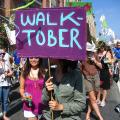 Happy Walktober!
Happy Walktober!
Resource Library

Many of the ideas presented are simple, but have immense potential to improve the overall success, health and well-being of our City’s students. This Active Design Toolkit for Schools provides ideas and resources to incorporate active design into your school.
 Over the last few months, a great deal of momentum and synergy has been built around schools and communities initiating joint use (or shared use) agreements, which allow for the sharing of property between two entities to increase physical activity and improve nutrition among their residents. Although these efforts are good and collabor
Over the last few months, a great deal of momentum and synergy has been built around schools and communities initiating joint use (or shared use) agreements, which allow for the sharing of property between two entities to increase physical activity and improve nutrition among their residents. Although these efforts are good and collabor
While the overwhelming majority of driving occurs within metropolitan areas, many large urban highways and arterial roads cost substantially more money to maintain than they generate in fuel taxes.
 August 13-15, 2013 will be here before we know it, so make your plans now to join us in Sacramento for the Safe Routes to School National Conference! Check out the revamped website at www.saferoutesconference.org, and take a look at our Save the Date.
August 13-15, 2013 will be here before we know it, so make your plans now to join us in Sacramento for the Safe Routes to School National Conference! Check out the revamped website at www.saferoutesconference.org, and take a look at our Save the Date.

This website provides a list of different audits for various settings and environmental attributes. The general purpose of an audit is to identify concerns for pedestrians and bicyclists related to the safety, access, comfort, and convenience of the environment.
 In 2005, North Carolina began a new era in how it viewed bicycles and pedestrians on its roadways. North Carolina Department of Transportation welcomed Safe Routes to School funding and created a specialty license plate that allowed its residents to show their support for bicycle and roadway safety.
In 2005, North Carolina began a new era in how it viewed bicycles and pedestrians on its roadways. North Carolina Department of Transportation welcomed Safe Routes to School funding and created a specialty license plate that allowed its residents to show their support for bicycle and roadway safety.
As the project progresses, it will offer more precise benchmarks and recommendations for advocates and government officials so that they have the data they need to improve bicycling and walking in the United States and eventually all of North America.
 The Greater Washington DC region was recently ranked in a report as #1 for congestion.
The Greater Washington DC region was recently ranked in a report as #1 for congestion.
 Of 52 documented Complete Streets policies in Florida, more than 20 were passed in 2012-2013. Florida network members were instrumental in the success of many of these policies.
Of 52 documented Complete Streets policies in Florida, more than 20 were passed in 2012-2013. Florida network members were instrumental in the success of many of these policies.
These PowerPoint slides summarize MAP-21, its impact on transportation funding, and opportunities for supporting walking/biking projects.

School districts that adopt school bicycling or walking policies ensure that transportation safety rules for the district are consistent and standardized. Policies developed at this jurisdictional level can also help lay the groundwork for better and safer behaviors. This document provides a model school walking policy.
 Engaging local elected officials is not a new component of Safe Routes to School – in fact, it has been an integral part of the process since the inception of Safe Routes to School programs and projects.
Engaging local elected officials is not a new component of Safe Routes to School – in fact, it has been an integral part of the process since the inception of Safe Routes to School programs and projects.
According to CSBA’s research with school governance teams in California, schoolboard members recognize the link between student health and academicachievement, but when faced with a multitude of competing priorities and limitedresources, are hard pressed to make wellness a high priority in the district/COE.
 This week has been jam packed with great Safe Routes to School events. The week kicked off on Sunday with the Takoma Park 5K for Safe Routes to School.
This week has been jam packed with great Safe Routes to School events. The week kicked off on Sunday with the Takoma Park 5K for Safe Routes to School.

The Safe Routes Partnership is implementing the State Network Project to ensure program success and leverage resources by creating SRTS State Networks in nine states and the District of Columbia. The following report outlines how State Networks can create policy change.

